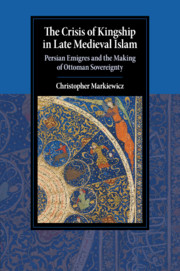Book contents
- The Crisis of Kingship in Late Medieval Islam
- Cambridge Studies in Islamic Civilization
- The Crisis of Kingship in Late Medieval Islam
- Copyright page
- Contents
- Figures
- Maps
- Acknowledgments
- Note on Usage
- Abbreviations
- Book part
- Introduction
- Part I
- 1 The Realm of Generation and Decay
- 2 Patronage and Place among the Ottomans
- 3 The Return East, 1511–1520
- Part II
- Conclusion
- Book part
- Bibliography
- Index
- Series page
1 - The Realm of Generation and Decay
Bidlisi in Iran, 1457–1502
from Part I
Published online by Cambridge University Press: 03 August 2019
- The Crisis of Kingship in Late Medieval Islam
- Cambridge Studies in Islamic Civilization
- The Crisis of Kingship in Late Medieval Islam
- Copyright page
- Contents
- Figures
- Maps
- Acknowledgments
- Note on Usage
- Abbreviations
- Book part
- Introduction
- Part I
- 1 The Realm of Generation and Decay
- 2 Patronage and Place among the Ottomans
- 3 The Return East, 1511–1520
- Part II
- Conclusion
- Book part
- Bibliography
- Index
- Series page
Summary
During the first forty years of Idris Bidlisi’s life, Persian lands suffered monumental geopolitical strains that profoundly affected his personal outlook and professional inclinations. During the period between his birth in 1457 and the end of the fifteenth century, Bidlisi’s homeland in western Iran witnessed the rise and fall of a major Turkmen dynasty, the Bayandur clan of the Aqquyunlu confederation, the imperial aspirations of which were shortly followed within a matter of decades by a complete descent into chaos and disorder. The resounding success and subsequent unraveling of the Aqquyunlu experiment shaped the educational, social, and professional opportunities available to Bidlisi. Drawn by the cultural resplendence of the recently ascendant Aqquyunlu court, Bidlisi decided to enter sultanic service as a young man. His professional rise within the court seemed to reflect inversely the more general devolution of Aqquyunlu fortunes in the waning decades of the fifteenth century. By the late 1480s, as Bidlisi entered middle age, he had attained one of the highest offices of state, even as the political instability resulting from years of dynastic conflict and civil war brought the Aqquyunlu polity to the brink of destruction.
- Type
- Chapter
- Information
- The Crisis of Kingship in Late Medieval IslamPersian Emigres and the Making of Ottoman Sovereignty, pp. 25 - 65Publisher: Cambridge University PressPrint publication year: 2019



